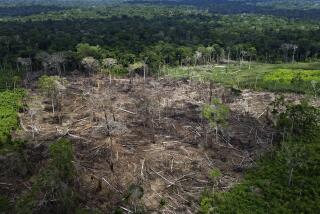Breaking into the ‘90s. A New World in Time. Walls fall, debts rise, politicians thrive, environments suffer-a look over the shoulder and over the horizon. : Environment: Think Process, Not Events
- Share via
PLAINFIELD, N.H. — The most important environmental event of the 1980s? A hard choice-- such a sterling list of candidates.
Chernobyl? High on the list. Its effects will live on for decades in the soils of Europe and in the cells of plants, animals and people.
The Exxon Valdez oil spill? Visually spectacular, a desecration of one of the world’s last pristine areas. But after 10 years, maybe 20, barring further spills, nature will probably bounce back from that one.
Discovery of the ozone hole over Antarctica? Though it didn’t immediately inconvenience anyone north of Australia, this was a profound event. It demonstrated that human-generated pollution can actually derange a planet-sized natural process. It catapulted environmental policy-making to the global level.
The summer of ’88 with its drought, hurricanes, Yellowstone fires and contaminated beaches? Significant, but not for the reasons once given. It may or may not have been the kickoff event for an overheated greenhouse future. It was for sure a wake-up call, though, launching the second round of media and political environmental attention in 20 years. Where there’s attention, there’s at least a potential for progress.
One could nominate other disasters --Bhopal, the Islip garbage barge, the African drought, the Sandoz fire that dumped toxic chemicals into the Rhine. Most U.S. environmentalists would probably nominate the election of Ronald Reagan to the presidency as the single worst ecological happening of the decade.
But there was also good news in the ‘80s. Debt-for-nature swaps. The Montreal Agreement, producing international cooperation in cutting back the chemicals that cause the ozone hole. The new civic energy behind recycling (dealing so far only with the first half of the process, separating trash; equal creativity is needed to create markets for recycled materials.)
That’s the beginning of a list, but it’s difficult to approach the problem that way, because I don’t see history as a series of events. The opening of the Berlin Wall was a momentous event, though it can be understood--and its implications for the future divined--only in the context of decades of oppression and economic decay, followed by first a cautious, then an ever more raucous opening to glasnost and perestroika . Ecological events, even more than political ones, are attention-getting blips in underlying stories that unfold over generations.
The garbage barge was just a symbol of problems caused by continuously growing streams of waste filling finite holes in the ground. The ozone hole was a fortuitous concentration in one place of a planet-wide degradation process. (Fortuitous because it was spectacular enough to attract attention and also because it formed over the unpopulated South Pole instead of, say, India or the West Coast of the United States.)
If we list not events but underlying processes, I would mark the following as the most significant happenings of the decade--and the ones with the greatest import for the decade to come:
* Population growth. In 1980 the world population was 4.5 billion. In 1990 it will reach 5.3 billion. By the year 2000, 6.3 billion. That will be an increase over the next 10 years equal to the entire current populations of North America, Western Europe and the Soviet Union combined.
* Buildup of greenhouse gases. In 1980 the concentration of carbon dioxide in the atmosphere was 339 parts per million, already 25% above pre-industrial “normal.” Now it is 353 p.p.m. If our rate of emission of greenhouse gas continues on its current path, in 10 more years the concentration will be 370 p.p.m. Over the past decade the atmospheric concentrations of chlorofluorocarbons (CFCs, potent greenhouse gases as well as ozone-eaters) doubled. Even with the Montreal Agreement, they will rise 50% higher by the year 2000.
* Land degradation. Since 1980 human mismanagement has eroded, salted or desertified about 1 million square miles of once-productive land to the point of economic uselessness. That’s an area four times the size of Texas. Over the same period about 400,000 square miles of tropical forest have been leveled, an area nearly twice that of France, about one-tenth of all the tropical forest on Earth. The forces that have caused this degradation are all likely to intensify over the next decade.
* Extinction. Estimates of the number of species of life we have eliminated since 1980 range from 3,000 to 30,000. (The total number of species on Earth could be anywhere between 3 million and 10 million.) The rate of extinction is expected to go up by a factor of roughly 10 over the next decade. The fact that we don’t know these numbers exactly does not detract from their enormity. The human-induced extinction of a single species is an enormity.
Steadily accelerating increases in human population, economic activity, destruction of the Earth’s resources and production of wastes--these are the uneventful processes that underlie attention-grabbing environmental events. If we do nothing about them, they will produce even more disastrous headlines in the 1990s than in the 1980s. Each newsworthy event will be a small symptom of a global system ever more out of balance.
We do, of course, have within our power the creation of good news for the ‘90s; in fact we could create the greatest news since the dawn of the industrial revolution.
That will come if we exert intelligence, morality and common humanity to control our numbers, our wastefulness--and our greed.
That will come if we define for ourselves a far more worthy and satisfying goal than getting richer--a goal such as living in harmony with each other and the planet. A goal for generations, not just a decade. But there’s no better decade in which to start than the one we’re about to enter.
More to Read
Sign up for Essential California
The most important California stories and recommendations in your inbox every morning.
You may occasionally receive promotional content from the Los Angeles Times.










